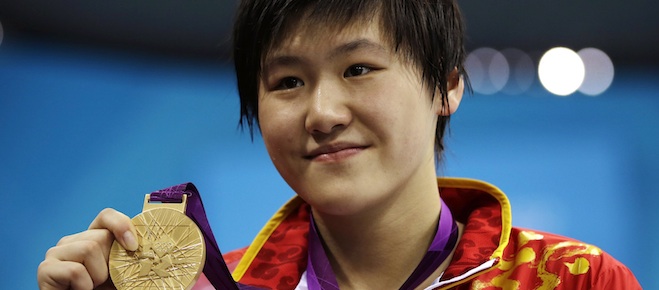Is that any way to talk about China’s athletes?
It’s too easy to substitute the mythic regime, for the real people who represent it
FILE – In this July 31, 2012 file photo, China’s Ye Shiwen poses with her gold medal for the women’s 200-meter individual medley swimming final at the Aquatics Centre in the Olympic Park during the 2012 Summer Olympics in London. Chinese reacted angrily to doping accusations swirling around their newest swimming superstar Ye who won two gold medals at the London Olympics. (AP Photo/Matt Slocum, File)
Share

There’s a thread of distrust and disdain running through this year’s Olympics that’s reminiscent of Cold War era Summer Games reportage. Except now it’s not the Eastern Bloc, but the Far East, specifically China, being cast in the role of the Other.
To wit: China’s child-fuelled medal machine keeps cranking out Olympic gold. Chinese gold medal diver Wu Minxia kept in dark over mother’s cancer. Chinese throw badminton match to South Koreans was one headline (presumably changed to reflect the fact that the South Koreans were cheating, too.) And the kicker: Doping questions targeting Chinese swimmer.
Those are just the headlines. The commentary is often even more pointed, and the gist of it is this: China’s a resurgent empire with overweening ambitions; they’ve done anything they can to win in the past, and they might do it again. The subtler, but pervasive suggestion is that the Chinese people who ‘fuel the machine’ live in compliant servitude to it.
To be clear: China is no utopia. Let’s not be naive. But it’s too easy to subscribe to an evolving narrative of “otherness,” with the Chinese athletes as the latest authoritarian anti-heroes.
Never mind that the badminton scandal’s a national disgrace in China. Never mind that Yi Shiwen (pictured above), the swimmer whose record-setting time instantly drew accusations of doping, cleared all doping controls. Never mind that Canada has a program called Own the Podium that proudly seeks to fulfill our own overweening ambitions. Never mind the list of Canadians implicated in doping and drugs-related issues over the years.
Some may object that Canada’s a democracy, and there’s a vast difference in degree here. China, after all, is noted for human rights abuses, an authoritarian government, rampant industrialism, and recalcitrance in global diplomacy.
Fair point. But China, leading in the medal count, foreign and far away, is too easily cast as the enemy. And the less we know about the individual Chinese Olympians, the easier that is.
We know the most successful of our own athletes by name, and many of the best competitors from friendly nations, too. We know easy-going Michael Phelps, plucky Jordyn Wieber, joyous Usain Bolt. Who do we know by name from China? Ye Shiwen, the 16-year-old kid who’s racked up two golds already. All the average armchair Olympics fan knows about her is her age, her achievements, and the allegations against her. Anybody else?
We have to be careful when we talk about China’s athletes. It’s too easy to make generalizations that unconsciously substitute the mythic regime, for the real people who represent it. Their own personal travails, their triumphs and their tragedy can easily become lost in the process.
When we do that, we echo the worst of what an authoritarian nation does: subsume the individual, in favour of the state.